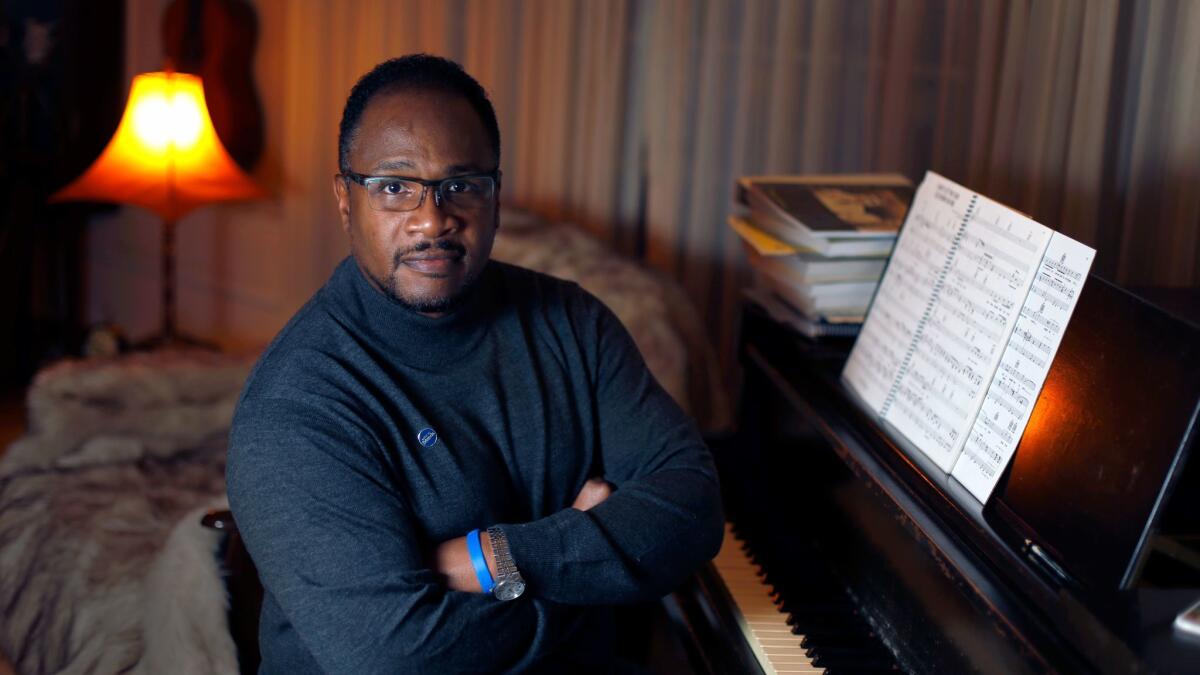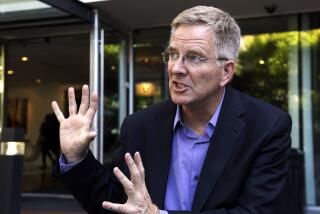Life after cancer: “The real battle happened after treatment”
Bin McLaurin was lucky. Doctors detected his prostate cancer early, and he successfully completed the surgery, radiation and hormone therapy he needed to keep the disease at bay.
But two years out from his 2014 diagnosis, McLaurin didn’t feel so great. He had gained 60 pounds during treatment, and the hormones he was taking sapped his energy and drive.
No one had fully explained the emotional after-effects he would experience once the cancer interventions had ended — that he might feel depressed, that he couldn’t be sexually active right away and that he might even have to wear adult diapers for a period of time.
“I was devastated and surprised,” says McLaurin, now 49 and back at work as a research assistant at the Cedars Sinai Heart Institute. “The real battle happened after treatment.”
The real battle happened after treatment.
— Bin McLaurin, prostate cancer survivor

Getting a new lease on life after fighting cancer is a gift, and many, including McLaurin, say surviving cancer has enhanced their lives in ways they could have never expected.
At the same time, it’s not unusual for cancer survivors to experience unexpected bumps in the road once the disease is gone. Getting “back to normal” doesn’t mean going back to life exactly as it was before. Survivors face psychological, emotional and physical challenges, which frequently go unacknowledged by most of those around them.
“It’s something patients live with but don’t bring up,” says Dr. Stephen J. Forman, who treats patients with blood cancers such as leukemia and lymphoma at City of Hope in Duarte.
Forman and others argue that it makes sense to view survival as part of the cancer journey.
“Care of the patient with cancer doesn’t stop with the completion of treatment and remission,” he says. “There’s a recovery period that can be short or long, as they confront life — work life, family life, sexual life — having had this experience.”
Thanks to advances in detection and treatment, there are around 15.5 million cancer survivors in the U.S., a number that is expected to rise to 20.3 million by 2026, according to the National Cancer Institute.
Two-thirds of these recovered patients are more than five years past their diagnosis and at relatively low risk of recurrence. But depending on the type of cancer he or she had, a survivor might face a host of lingering physical effects from treatment, including fatigue, pain, nerve damage and “chemo brain,” a term used to describe difficulties with short-term memory and multitasking that can make it hard to return to work.
Dr. Saro Armenian, a pediatric oncologist at City of Hope, researches the long-term health problems of childhood cancer survivors, who can live for many decades after their cancer is gone. Studies have found that treatments like chemo and radiation are like “stepping on the gas pedal of aging,” causing childhood cancer survivors to face a heightened risk — and earlier onset — of common geriatric woes, such as heart disease and frailty.
The pressures of short-term and long-term health problems can exacerbate the psychological challenges cancer survivors face, serving as a constant reminder of the traumatic ordeal they’ve been through.
FULL COVERAGE: If you think you know cancer, it’s time to think again »
Los Angeles breast cancer survivor Meryl Kern, 61, says she has struggled with joint pain and extreme fatigue since completing chemotherapy, radiation, a double mastectomy and multiple reconstructive surgeries last year. The surgeries, in combination with hormone-blocking medications, have changed her appearance, too — another source of distress.
“I’m not looking for perfection, but I’m looking for something that, when I look in the mirror, gives me some sense of normalcy,” she says.
Many cancer survivors have to work hard to overcome fears of recurrence.
Jenny Veliz-Urzua, a nurse practitioner who works with cancer survivors at Harbor-UCLA Medical Center, tries to offer reassurances: The chances that cancer will return go down steadily over time.
It does get easier for patients, generally, but some can’t make the mental leap. “A lot of our patients, even though they’re cancer-free, don’t believe that they’re cancer-free,” Veliz-Urzua says.
I was never really past it. I knew that in an instant, my life can change.
— Sheila Henry, who survived multiple bouts with cancer
For Sheila Henry, a 52-year-old multiple cancer survivor in El Segundo, a sense of worry has never fully abated. Diagnosed with chondrosarcoma in her left leg at age 18, Henry underwent surgery while still a high school senior in Pennsylvania, only to find during her second semester of college that her cancer had spread to her lung.
A second round of treatment made her cancer-free, though later in life Henry had two breast cancers and basal cell carcinoma, a form of skin cancer, all of which were treated at UCLA in Westwood.
“The further I got out, the more I was looking for the next one,” she says. “I was never really past it. I know that in an instant, my life can change.”
It can be hard for cancer survivors to step out of the focused, cocoon-like environment of getting treatment — where support is easy to come by — into the wider world, where most people don’t understand the longer-lasting effects of treatment, and don’t spend every day thinking about impending mortality.
“I was so confused,” says Kern, of the depression she experienced after her cancer was gone. “When people said, ‘You must feel great!’ I was beating myself up because I didn’t. It was, ‘What’s wrong with me?’ ”
In Henry’s case, having cancer encouraged her to take healthy risks: to live in Europe during college, to ask her now-husband out on a date during her first bout with breast cancer, to take on empowering work doing fundraising for cancer research — and then to leave that job later in life so she could spend more time with her teenage son and step away from daily reminders of the disease.
“When you’re thrown into that cauldron, things become really clear — the things that are important,” she says.
Kern has launched a business and started a foundation, both of which work with cancer survivors who may be feeling the same ups and downs that she experienced. McLaurin, too, has thrown himself into a project that educates men about the unexpected side of cancer survival.
“It’s harder for men. We don’t cry out for help,” he says.
“There’s no handbook that tells you what happens when you’re done with treatment. Each day is a discovery,” he says. “But I’m enjoying life more than I did before. It’s a different life, but it’s definitely a joyful experience.”
MORE IN HEALTHY LIVING
With cancer, it’s not necessarily where it starts but how it starts
Your guide to the latest in cancer screening tests: Which do you need, which can you skip?







